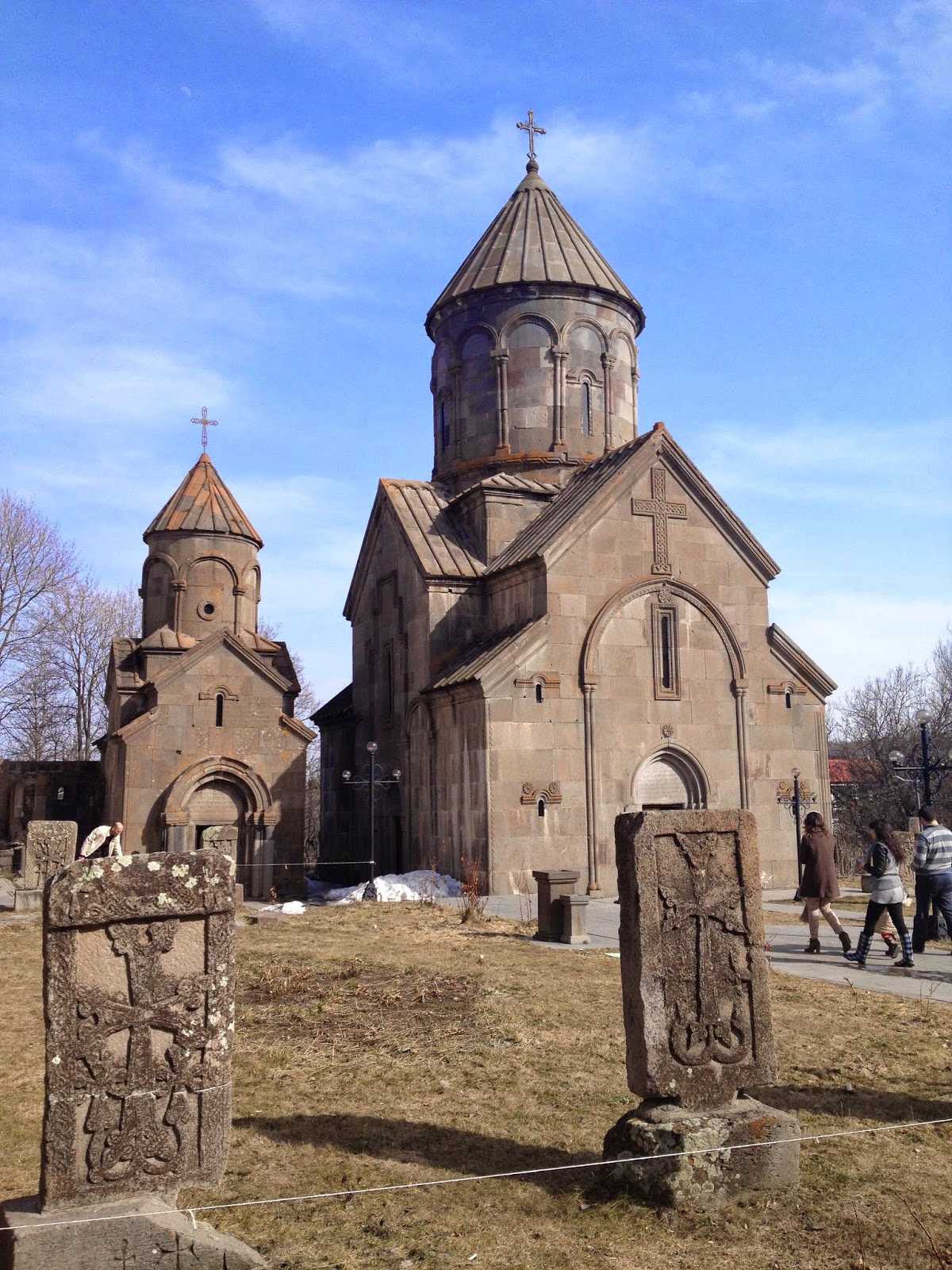https://www.youtube.com/watch?v=fKg_BWUA0sA
May 12, 2014
Apr 7, 2014
These Artists In War-Ravaged Damascus Have Broken A Guinness World Record
Using the scraps of war, six Syrian artists constructed the largest mural on record made from recycled material.
It took Syrian artist Moaffak Makhoul and his team six months to complete the mural in the upscale Al Mazzeh area of Damascus. Guinness announced the win onFacebook on March 26.
The team used scrap objects like broken mirrors, bicycle wheels, and aluminum cans to construct the mural, measuring 7,749.98 feet across.
“In the difficult conditions that the country is going through, we wanted to give a smile to the people, joy to the children, and show people that the Syrian people love life, love beauty, love creativity,” Makhoul told reporters, according to Reuters.

“I’ve been sad to see a lot of my colleagues, artists, all traveling abroad and leaving,” said Makhoul. “God be with them and give them luck - but the country also needs all of us.”The Syrian conflict has killed more than 140,000 and displaced 9 million people since 2011. Damascus has remained largely under government control and relatively shielded from the conflict, which has devastated infrastructure and economic activity.
“The mural gives us hope again,” Souheil Amayri, who helped with the project, told the Daily Star. “Damascus is wounded and sad… and creating something beautiful from rubbish means that we can rebuild despite the destruction.”
Apr 1, 2014
This is the story of my best friend's great-grandmother...
The extraordinary story of 100-year-old Yevnigue Salibian, one of the last people alive who can recall the horror of the Armenian genocide, Her life was saved by the reins of a horse as her family fled the brutality of Ottoman rule
She was a child of the Great War, born on a faraway killing field of which we know little, one of the very last witnesses to the last century’s first genocide, sitting in her wheelchair, smiling at us, talking of Jesus and the Armenian children whipped by the Turkish police whom she saw through the cracks in her wooden front door. It’s not every day you get to meet so finite an observer of human history, and soon, alas, we will not see her like again in our lifetime.
She was a child of the Great War, born on a faraway killing field of which we know little, one of the very last witnesses to the last century’s first genocide, sitting in her wheelchair, smiling at us, talking of Jesus and the Armenian children whipped by the Turkish police whom she saw through the cracks in her wooden front door. It’s not every day you get to meet so finite an observer of human history, and soon, alas, we will not see her like again in our lifetime.
They took me to meet Yevnigue Salibian last week up in the Mission Hills of California, whose warm breezes and palm trees are not unlike the town of Aintab in which she was born more than a hundred years ago. She is an old lady now in a home for the elderly but with a still impeccable memory and an equally sharp and brutal scar on her thigh – which she displays without embarrassment – where a horse’s reins suspended her above a ravine until she almost bled to death in her final flight from her Armenian homeland. “Hushhhhhh,” she says. “That’s how the blood sounded when it poured out of me. “I still remember it: ‘hushhhhhh’, ‘hushhhhhh’.”
The facts of the Armenian Holocaust are as clear and real as those of the later Jewish Holocaust. But they must be repeated because the state of Turkey remains a holocaust denier, still insisting that the Ottoman government did not indulge in the genocide which destroyed a million and a half of its Armenian Christian population almost a century ago. The Armenians were axed and knifed and shot in their tens of thousands, the women and children sent on death marches into the deserts of northern Syria where they were starved and raped and slaughtered. The Turks used trains and a primitive gas chamber, a lesson the Germans learned well. Very soon, there will be no more Yevnigues to tell their story.
She was born on 14 January 1914, the daughter of Aposh Aposhian, an Aintab copper merchant who taught his five children the story of Jesus from a large Bible which he held on his lap as he sat with them on a carpet on the floor of their home. They were – like so many Armenians – a middle-class family, and Aposh had Turkish friends and, although Yevnigue does not say so, it appears he traded with the Ottoman army; which probably saved their lives. When the first deportations began, the Salibians were left in their home, but the genocide lasted till the very last months of the Great War – it had begun within weeks of the Allied landings at Gallipoli – and in 1917, the Turks were still emptying Aintab of its Armenians. That’s when the sound of crying led three-year-old Yevnigue to the front door of her home.
“It was an old wooden door and there were cracks in it and I looked through the cracks,” she says. “There were many children outside without shoes and the Turkish gendarmes were using whips to drive them down the street. A few had parents. We were forbidden to take food to them. The police were using whips on the children and big sticks to beat them with. The sounds of the children screaming on the deportation – still I hear them as I look through the cracked door.”
So many parents were killed in the first year of the Armenian genocide that the orphans – tens of thousands of feral children who swarmed through the land in their absence – were only later driven out by the Turks: these were tiny deportees whom Yevnigue saw. The Aposhians, however, were able to cling on until the French army arrived in eastern Turkey after the Ottoman surrender. But when Mustafa Kemal Ataturk launched a guerrilla war against the French occupiers of his land, the French retreated – and in 1921 the surviving Armenians fled with them to Syria, among them Yevnigue and her family, packed into two horse-drawn carts. She was among the very last Christians to leave her Armenian homeland.
“My family was divided between the two carts. I changed places with an old lady. It was at night and over a ravine, our horses panicked, and the cart overturned and an iron bar killed the old lady and I was thrown over the edge of a bridge and only the horse’s reins saved me when they got wrapped around my leg. Jesus saved me. I hung there and there was the ‘hushhhhhh’ sound of my blood pouring out of me.” Yevnigue shows the harsh scar on her leg. It has bitten deeply into the muscle. She was unconscious for two days, slowly recovering in Aleppo, and then Damascus and finally in the sanctuary of Beirut.
The remainder of her life – as she tells it – was given to God, her husband and the tragedy of losing one of her sons in a Lebanese road accident in 1953. A photograph taken on her arrival in Beirut shows Yevnigue to have been an extraordinarily pretty young woman and she had, she says, many suitors. She eventually chose a bald-headed Evangelical preacher, an older man called Vahran Salibian who had a big smile and whose name – Salibi – means crusader. “He had no hair on his head but he had Jesus in his heart,” Yevnigue announces to me. Vahran died in 1995 after 60 years of marriage and Yevnigue has lost count of her great grandchildren – there are at least 22 so far – but she is happy in her cheerful Armenian nursing home.
“It’s not a good thing to be away from your family – but I like this place. Here, it is my extended family.” She loves America, Yevnigue says. Her family fled there when the civil war began in Lebanon in 1976. “It is a free place. All people come from everywhere to America. But why is our President a Muslim?”
I try to convince her this is untrue. She reads the New Testament every day and she talks constantly of her love for Jesus – this is an old lady who will be happy to die, I think – and when I ask her how she feels today about the Turks who tried to destroy the Armenians, she replies immediately. “I pray for Turkey. I pray for the Turkish officials that they may see Jesus. All that is left of the Prophet Mohamed is dust. But Jesus is alive in heaven.”
And I am taken aback by this, until I suddenly realise that I am not hearing the voice of a hundred-year-old lady. I am listening to a three-year old Armenian girl whose father is reading the Bible on the floor of a house in Aintab and who is looking through the cracks of her wooden front door and witnessing her people’s persecution.
Mar 18, 2014
36 Photos to Remind You of Syria's Beauty...
http://scoopempire.com/photos-remind-beautiful-syria/.UyltVfmSySo
Feb 5, 2014
Saudi Arabia's Brilliant Recipe for Dominating the Middle East
http://www.alternet.org/world/constantly-underestimated-misunderstood-house-saud?page=0%2C0
Feb 4, 2014
Syrian Christian Leaders Call On U.S. To End Support For Anti-Assad Rebels Read more: Syrian Christians Ask US Washington to End Support For Rebels
By Elizabeth Dias
The stories told by five top Syrian Christian leaders about the horrors their churches are experiencing at the hands of Islamist extremists are biblical in their brutality.
Bishop Elias Toumeh, representative of the Greek Orthodox Patriarch of Antioch and All the East, tells of the funeral he led ten days ago for the headless body of one of his parishioners in Marmarita. Rev. Adeeb Awad, vice moderator of the National Evangelical Synod of Syria and Lebanon, explains how the rebels blew up his church and then pointed the finger at the regime. Bishop Armash Nalbandian, primate of the Armenian Church of Damascus, says he received word on Facebook from a fellow bishop in Aleppo that two congregants were traveling when opposition fighters stopped their bus, made them present their Armenian IDs, and then took them away. The fighters, Nalbandian recounts, returned to the fellow passengers a few hours later with a box, which they said were cakes. Inside were the two Armenian heads.
The bishops’ stories are difficult to independently verify, and the war’s death toll goes far beyond just Christian communities in Syria–more than 130,000 people have been killed since the fighting began, and at least two million others have fled the country. But they are emerging as part of a concerted push by Syrian Christians to get the U.S. to stop its support for rebel groups fighting Syrian president Bashar al Assad. “The US must change its politics and must choose the way of diplomacy and dialogue, not supporting rebels and calling them freedom fighters,” says Nalbandian.
The group is the first delegation of its kind to visit Washington since the crisis began three years ago, and its five members represent key different Christian communities in the country. Awad, Toumeh, and Nalbandian were joined by Rev. Riad Jarjour, Presbyterian pastor from Homs, and Bishop Dionysius Jean Kawak, Metropolitan of the Syrian Orthodox Church. The Westminster Institute and Barnabas Aid, two groups that focus on religious freedom and relief for threatened faith communities, sponsored their trip.
Given the United States’ increased support for non-terrorist rebel groups in the wake of the Assad regime’s use of chemical weapons, the religious leaders’ mission is a long shot. The bishops are asking the United States to exert pressure on countries like Saudi Arabia, Qatar, and Turkey to stop supporting and sending terrorist fighters to Syria. “The real problem is that the strong military opposition on the ground is a foreign opposition,” Awad explains, arguing that US support of opposition groups means support for foreign terrorist fighters. “They are the ones killing and attacking churches and clergy and nuns and burning houses and eating human livers and hearts and cutting heads,” Awad says.
The Syrian Christian churches are not publicly calling for outright support of the Assad regime. Doing so would further endanger their followers and hurt the moral component of their case, given the regime’s alleged use of chemical weapons against civilians. Instead, they’re meeting privately with law makers, diplomats and think tanks. Sunday evening, they spoke with Rep. Frank Wolf (R-VA) at St. John the Beloved Catholic church in nearby McLean. On Monday, they held court at the Heritage Foundation and Catholic University of America. On Tuesday, they met with Rep. Anna Eshoo (D-CA), Rep. Robert Aderholt (R-AL) and Rep. Louie Gohmert (R-TX), and then met with leaders of the U.S. Commission on International Religious Freedom. Wednesday’s lineup included Sen. Lindsay Graham (R-SC), Sen. John McCain (R-AZ), Sen. Joe Manchin (D-WV), State Department officials including Lawrence Silverman, Near East Affairs deputy acting aecretary, and Uzra Zeya, acting assistant secretary for the Bureau of Democracy, Human Rights, and Labor, and then a final stop at the U.S. Institute for Peace.
It’s been a difficult issue to gain traction on, if for no other reasons than that support for Christians and endangered minorities can appear as support for Assad and that an entire country is being destroyed by war, not just Christian communities. President Obama only briefly mentioned Syria in his State of the Union address on Tuesday. “In Syria, we’ll support the opposition that rejects the agenda of terrorist networks,” he said. “American diplomacy, backed by the threat of force, is why Syria’s chemical weapons are being eliminated, and we will continue to work with the international community to usher in the future the Syrian people deserve—a future free of dictatorship, terror and fear.”
Traction in Congress has also been a challenge, but a handful of leaders are speaking out. The U.S. House of Representatives passed legislation in September, authored by Wolf and Eshoo, to create a special religious minorities envoy at the State Department who would work for policy options to protect faith communities, but the bill has yet to move forward in the Senate. “Meeting with the delegation of Syrian Christian church leaders this week provided a constructive opportunity to raise awareness and to discuss concrete steps that can be taken to help protect Christians and other religious minorities in Syria,” says Eshoo. “Christians in the U.S. should be informed by their leaders about the atrocities taking place in Syria. The history of violence against religious minorities must not be allowed to repeat itself.”
Wolf has championed the cause during his congressional tenure, but he is retiring at the end of this term. Newer leaders like Aderholt see it as a time to take a stand. “Most Americans do not realize that Christians across the Middle East are in grave danger and have often been forced to leave their home countries due to persecution and threats from radicalized Muslims,” he says. “If we want a true democracy to emerge from this region, Christians and other religious minority voices must share in the decision-making process, and certainly not be persecuted and fear for their lives due to extremist elements that are pouring in to Syria.”
The bishops’ stories are similar to other grim instances of violence against Christians during the war. Christian schools in Damascus were shelled in November. The next month, a dozen Greek Orthodox nuns were taken from Mar Takla Monastery in Maaloula. Rebel groups abducted two bishops near Aleppo last April. Jesuit priest Paolo Dall’Oglio, whom TIME wrote about in 2012 when he visited the United States on a similar lobbying trip, has been missing and feared dead since July.
Jan 28, 2014
Syria's heritage in ruins: before-and-after pictures
The war in Syria has claimed more than 130,000 lives and, as these images reveal, it is also laying waste to its historic buildings and Unesco-listed sites.
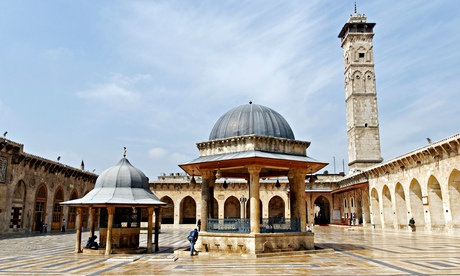
Umayyad mosque, Aleppo – pictured in 2012, before fighting destroyed it in 2013. Photograph: Alamy
They were sleepy tree-lined boulevards where people lived and worked, time-worn markets where they came to trade and exquisitely detailed mosques where, throughout the ages, they prayed.
All now stand in ruins, ravaged by a war that is not only killing generations of Syrians but also eradicating all around them, including sites that have stood since the dawn of civilisation. Across Syria, where a seemingly unstoppable war is about to enter a third year, a heritage built over 5,000 years or more is being steadily buried under rubble.
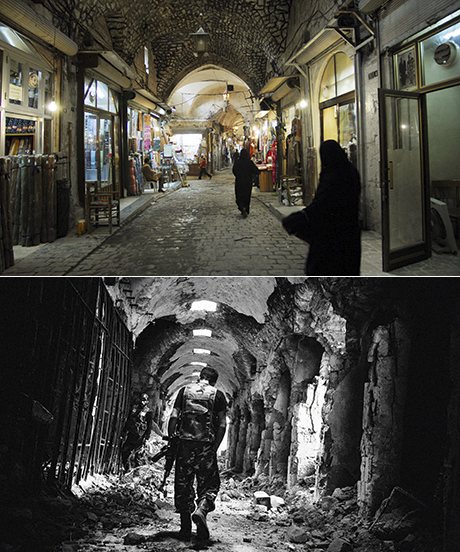 The Old Souk, Aleppo. Above in 2007 and below in 2013. Photographs: Corbis, Stanley Greene/Noor/Eyevine
The Old Souk, Aleppo. Above in 2007 and below in 2013. Photographs: Corbis, Stanley Greene/Noor/Eyevine
The destruction of towns and villages is regularly revealed by raw, and often revolting, videos uploaded to the web, which many people stopped watching long ago. Only seldomly do the shaky images reveal the damage being done beyond the battle – to ancient churches, stone Crusader fortresses and ruins that have stood firm during several millennia of insurrection and purge but are being withered away by this unforgiving war.
Syria's war has claimed more than 130,000 lives. At least two million of its citizens have fled into neighbouring states and more than two million others have been displaced within its borders. Industry and economy has long ground to a halt. Hope too has been on a relentless slide. Syria has six Unesco sites, representing at least 2,000 years of history. All have been damaged.
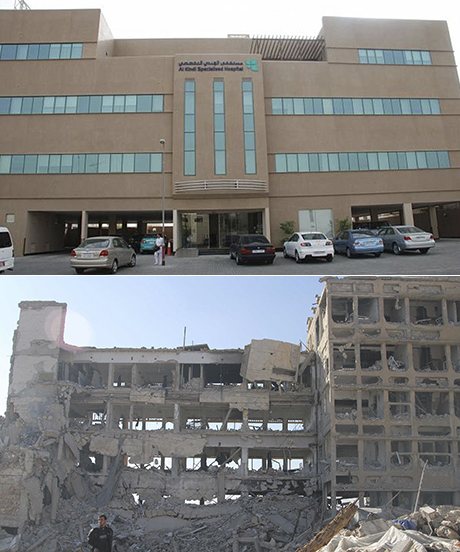 al-Kindi hospital, Aleppo. Above in 2012 and below in 2013. Photographs: Getty
al-Kindi hospital, Aleppo. Above in 2012 and below in 2013. Photographs: Getty
These before and after pictures show the old world order of Syria reflected for decades in history books; where people bought wares in marketplaces or mingled in mosque courtyards. They also reveal the shocking scale of devastation in all corners of the country and the damage done to Syria's soul and identity.
In Aleppo, one of the oldest covered marketplaces in the world is now in ruins; its maze of stone streets has been one of the most intense battlefields in the country for the past 18 months, bombed from above by air force jets and chipped away at ground level by close quarter battles that show no sentiment towards heritage. Those who dare raise their heads above the ruins, towards the ancient citadel that stands at the centre of the city, can also see damage to several of its walls.
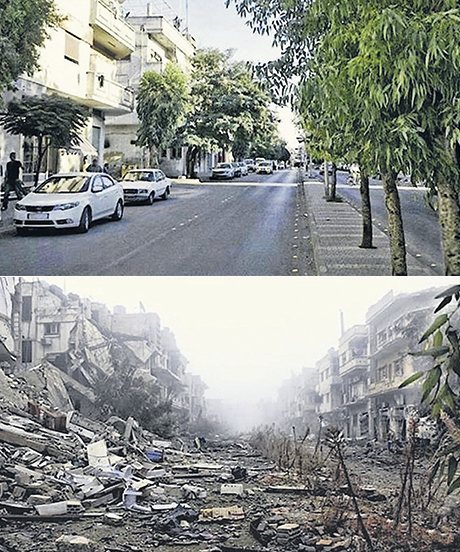 A street in Homs, in 2011 (above) and 2014 (below)
A street in Homs, in 2011 (above) and 2014 (below)
Several hundred miles south, just west of Syria's third city, Homs, one of the most important medieval castles in the world, Krak des Chevaliers, has taken an even heavier toll. Directly struck by shells fired from jets and artillery, the hilltop fortress now stands in partial ruin.
Homs itself has fared even worse. A residential street, where cars not long ago parked under gum trees, has been destroyed. Life has ceased to function all around this part of the city, as it has in much of the heartland of the country. In one shot, a destroyed tank stands in the centre of a street. The old minaret next to it has also been blown up. This photograph is thought to have been taken in the countryside near Hama, to the north of Homs. But it could just as easily encapsulate the damage done in parts of the capital, Damascus, or in towns and villages from Idlib in the north to Deraa in the south, where the first stirrings of insurrection in March 2011 sparked the war.
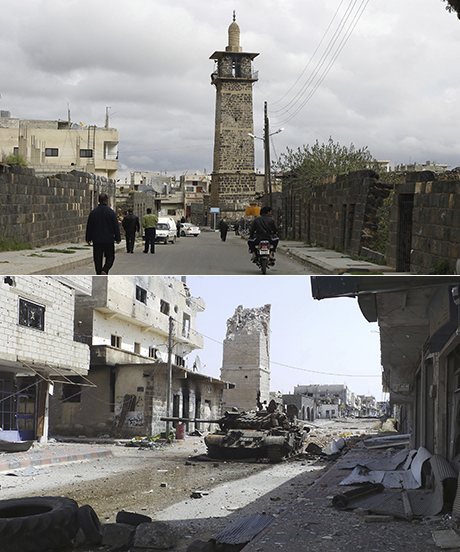 Omari mosque in Deraa. Above in 2011 and below in 2013. Photographs: Reuters
Omari mosque in Deraa. Above in 2011 and below in 2013. Photographs: Reuters
In May 2012, Emma Cunliffe, a Durham University PhD student, and member of the Global Heritage Network, prepared a report on the damage done to Syria's heritage sites, detailing the tapestry of civilisations that helped build contemporary Syria.
"Numerous bronze-age civilisations left their successive marks, including the Babylonians, the Assyrians and the Hittites," she said. "They, in turn, were replaced by the Greeks, the Sasanians, the Persians, the Romans and the Arabs, many of whom chose Syrian cities as their capitals. The European Crusaders came and left some of the most impressive castles known and the Ottoman Empire also made its mark. All these cultures co-existed and conflicted, forming something new and special and found nowhere else in the world."
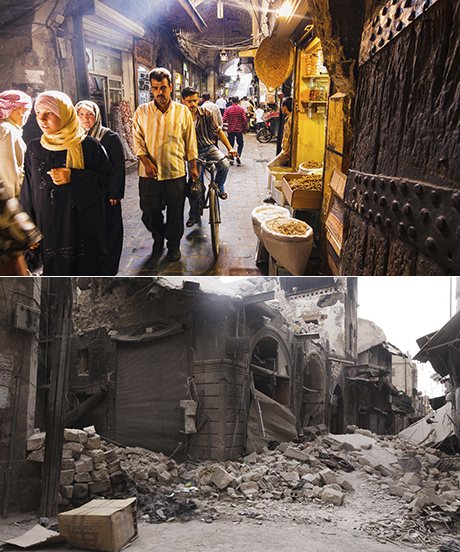 Souq Bab Antakya, Aleppo. Above in 2009 and below after an attack in 2012. Photographs: Alamy, Reuters
Souq Bab Antakya, Aleppo. Above in 2009 and below after an attack in 2012. Photographs: Alamy, Reuters
Speaking this week, she said the threat to Syria's heritage was now greater than ever. "Archaeological sites in Syria are often on the front lines of conflict and are experiencing heavy damage. Economic hardship and decreased security mean even sites away from the fighting are looted. This is denying not only Syrians but the world a rich heritage which can provide a source of income and inspiration in the future."
With little or no access to the country, satellite imagery is being used to track the destruction. The Global Heritage Fund's director of Global Projects, Dan Thompson said: "All of the country's world heritage sites have sustained damage, including the Unesco site cities, and a great many of the other monuments in the country have been damaged, destroyed or have been subject to severe looting.
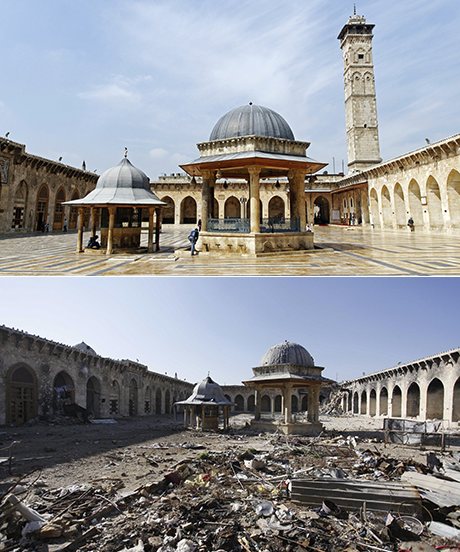 Umayyad mosque, Aleppo, pictured in 2012 (above) and 2013 (below). Photographs: Alamy, Corbis
Umayyad mosque, Aleppo, pictured in 2012 (above) and 2013 (below). Photographs: Alamy, Corbis
"Shelling, shooting, heavy machinery installed in sites, and major looting are the leading causes of damage and destruction to the sites, although I would not discount that vandalism is also playing a part. As far as we know, no concrete action is being taken to combat the damage in the present moment."
Jan 23, 2014
The world's most ancient Christian communities are being destroyed — and no one cares
By Michael Brendan Dougherty
Like many Coptic Christians in Egypt, Ayman Nabil Labib had a tattoo of the cross on his wrist. And like 17-year-old men everywhere, he could be assertive about his identity. But in 2011, after Egypt's revolution, that kind of assertiveness could mean trouble.
Ayman's Arabic-language teacher told him to cover his tattoo in class. Instead of complying, the young man defiantly pulled out the cross that hung around his neck, making it visible. His teacher flew into a rage and began choking him, goading the young man's Muslim classmates by saying, "What are you going to do with him?"
Ayman's classmates then beat him to death. False statements were given to police, and two boys were taken into custody only after Ayman's terror-stricken family spoke out.
Ayman's suffering is not an isolated case in Egypt or the region.
The Arab Spring, and to a lesser extent the overthrow of Saddam Hussein, were touted as the catalysts for a major historic shift in the region. From Egypt to Syria to Iraq, the Middle East's dictatorships would be succeeded by liberal, democratic regimes. Years later, however, there is very little liberality or democracy to show. Indeed, what these upheavals have bequeathed to history is a baleful, and barely noticed legacy: The near-annihilation of the world's most ancient communities of Christians.
The persecution of Christians throughout the Middle East, as well as the silence with which it has been met in the West, are the subject of journalist Ed West's Kindle Single "The Silence of Our Friends." The booklet is a brisk and chilling litany of horrors: Discriminatory laws, mass graves, unofficial pogroms, and exile. The persecuted are not just Coptic and Nestorian Christians who have relatively few co-communicants in the West, but Catholics, Orthodox, and Protestants as well.
Throughout the Middle East the pattern is the same. Christians are murdered in mob violence or by militant groups. Their churches are bombed, their shops destroyed, and their homes looted. Laws are passed making them second-class citizens, and the majority of them eventually leave.
August 26, 2013: Bishop-General Macarius (right), a Coptic Orthodox leader, walks around the damaged Evangelical Church in Minya, south of Cairo. | (REUTERS/Louafi Larbi)
In Egypt, a rumor that a Muslim girl was dating a Christian boy led to the burning of multiple churches, and the imposition of a curfew on a local Christian population. Illiterate children were held in police custody for urinating in a trash heap, because an imam claimed that pages quoting the Koran were in the pile and had been desecrated. Again, the persecution resulted in Christian families leaving their homes behind.
In Syria, the situation is even worse. In June 2013, a cluster of Christian villages was totally destroyed. Friar Pierbattista Pizzaballa reported that "of the 4,000 inhabitants of the village of Ghassanieh... no more than 10 people remain."
Two Syrian bishops have been kidnapped by rebel groups. Militants expelled 90 percent of the Christians in the city of Homs. Patriarch Gregorios III of Antioch says that out of a population of 1.75 million, 450,000 Syrian Christians have simply fled their homes in fear.
In Iraq, the story is the same but more dramatic. According to West, between 2004 and 2011 the population of Chaldo-Assyrian Christians fell from over a million to as few as 150,000. In 2006, Isoh Majeed, who advocated the creation of a safe haven for Christians around Nineveh, was murdered in his home. The number of churches in Iraq has declined to just 57, from 300 before the invasion. The decline of Iraq's Christian population since the first Gulf War is roughly 90 percent, with most of the drop occurring since the 2003 invasion.
The U.S. and the U.K. bear some responsibility in this catastrophe, since they oversaw the creation of Iraq's postwar government and did little to protect minority faiths.
West's book touches on the clueless and callous behavior of Western governments in these episodes. U.S. reconstruction aid to Iraq is distributed according to Iraqi laws that discriminate against Christian Iraqis. The U.S. pours billions of foreign aid into Egypt, and yet the Christians in that country are not allowed to build churches (or even so much as repair toilets in them) without explicit permission from the head of state, almost never granted. Last September, the U.S and Britain attempted to make their support of Syrian rebel groups explicit and overt, but at the same time some of these militias were executing a pogrom against Christians.
A Christian shopkeeper in Ma'loula summed it up in a quote to the BBC: "Tell the EU and the Americans that we sent you Saint Paul 2,000 years ago to take you from the darkness, and you sent us terrorists to kill us."
In an email to The Week, Ed West says there are things America and its allies can and should do to aid persecuted Christians:
Western countries should make clear that our friendship, cooperation, aid, and help depends on: 1) Religious freedom, which includes the right to change or leave religions; 2) A secular law that treats all people the same. That was not the case in Mubarak's Egypt, which the U.S. helped to prop up with $500 million a year. That is not the case in Iraq, which under U.S. control instigated sharia into its constitution. That shouldn't be acceptable. In 2022, Qatar will host the World Cup, a country where death for apostasy is still on the statute books. Why aren't we all boycotting it?
The last request does put the plight of Middle Eastern Christians in global context. Western activists and media have focused considerable outrage at Russia's laws against "homosexual propaganda" in the lead-up to the 2014 Sochi Winter Olympics. It would only seem fitting that Westerners would also protest (or at the very least notice) laws that punish people with death for converting to Christianity.
December 25, 2008: Iraqi Christians attend Christmas mass at the Virgin Mary church in Baghdad. | (Wathiq Khuzaie/Getty Images)
And yet the Western world is largely ignorant of or untroubled by programmatic violence against Christians. Ed West, citing the French philosopher Regis Debray, distils the problem thusly: "The victims are 'too Christian' to excite the Left, and 'too foreign' to excite the Right."
Church leaders outside the Middle East are afraid to speak out, partly because they fear precipitating more violence. (Seven churches were fire-bombed in Iraq after Pope Benedict XVI quoted an ancient criticism of Islam in an academic speech in Germany.) Oddly, unlike Iran, Saudi Arabia, Israel, and Russia, the U.S. and the U.K. are the only powers acting in the Middle East that do not take any special interest in the safety of those with whom they have a historical religious affinity.
These are the lands in which Jesus' apostles and their disciples made some of the first Christian converts. In an interview, West pointed out that these communities "were Christian when our ancestors were worshipping trees and stones." Now they are in danger of imminent extinction.
In 2013, Raphael I Sako, the Chaldean Patriarch of Baghdad, said the following at his installation homily, "Still the shadow of fear, anxiety, and death is hanging over our people." He warned: "If emigration continues, God forbid, there will be no more Christians in the Middle East. It will be no more than a distant memory." West's book is a sobering reminder that Western policy has helped shape this grim fate for Middle Eastern Christians — and Western silence allows it to continue.
Like many Coptic Christians in Egypt, Ayman Nabil Labib had a tattoo of the cross on his wrist. And like 17-year-old men everywhere, he could be assertive about his identity. But in 2011, after Egypt's revolution, that kind of assertiveness could mean trouble.
Ayman's Arabic-language teacher told him to cover his tattoo in class. Instead of complying, the young man defiantly pulled out the cross that hung around his neck, making it visible. His teacher flew into a rage and began choking him, goading the young man's Muslim classmates by saying, "What are you going to do with him?"
Ayman's classmates then beat him to death. False statements were given to police, and two boys were taken into custody only after Ayman's terror-stricken family spoke out.
Ayman's suffering is not an isolated case in Egypt or the region.
The Arab Spring, and to a lesser extent the overthrow of Saddam Hussein, were touted as the catalysts for a major historic shift in the region. From Egypt to Syria to Iraq, the Middle East's dictatorships would be succeeded by liberal, democratic regimes. Years later, however, there is very little liberality or democracy to show. Indeed, what these upheavals have bequeathed to history is a baleful, and barely noticed legacy: The near-annihilation of the world's most ancient communities of Christians.
The persecution of Christians throughout the Middle East, as well as the silence with which it has been met in the West, are the subject of journalist Ed West's Kindle Single "The Silence of Our Friends." The booklet is a brisk and chilling litany of horrors: Discriminatory laws, mass graves, unofficial pogroms, and exile. The persecuted are not just Coptic and Nestorian Christians who have relatively few co-communicants in the West, but Catholics, Orthodox, and Protestants as well.
Throughout the Middle East the pattern is the same. Christians are murdered in mob violence or by militant groups. Their churches are bombed, their shops destroyed, and their homes looted. Laws are passed making them second-class citizens, and the majority of them eventually leave.
August 26, 2013: Bishop-General Macarius (right), a Coptic Orthodox leader, walks around the damaged Evangelical Church in Minya, south of Cairo. | (REUTERS/Louafi Larbi)
In Egypt, a rumor that a Muslim girl was dating a Christian boy led to the burning of multiple churches, and the imposition of a curfew on a local Christian population. Illiterate children were held in police custody for urinating in a trash heap, because an imam claimed that pages quoting the Koran were in the pile and had been desecrated. Again, the persecution resulted in Christian families leaving their homes behind.
In Syria, the situation is even worse. In June 2013, a cluster of Christian villages was totally destroyed. Friar Pierbattista Pizzaballa reported that "of the 4,000 inhabitants of the village of Ghassanieh... no more than 10 people remain."
Two Syrian bishops have been kidnapped by rebel groups. Militants expelled 90 percent of the Christians in the city of Homs. Patriarch Gregorios III of Antioch says that out of a population of 1.75 million, 450,000 Syrian Christians have simply fled their homes in fear.
In Iraq, the story is the same but more dramatic. According to West, between 2004 and 2011 the population of Chaldo-Assyrian Christians fell from over a million to as few as 150,000. In 2006, Isoh Majeed, who advocated the creation of a safe haven for Christians around Nineveh, was murdered in his home. The number of churches in Iraq has declined to just 57, from 300 before the invasion. The decline of Iraq's Christian population since the first Gulf War is roughly 90 percent, with most of the drop occurring since the 2003 invasion.
The U.S. and the U.K. bear some responsibility in this catastrophe, since they oversaw the creation of Iraq's postwar government and did little to protect minority faiths.
West's book touches on the clueless and callous behavior of Western governments in these episodes. U.S. reconstruction aid to Iraq is distributed according to Iraqi laws that discriminate against Christian Iraqis. The U.S. pours billions of foreign aid into Egypt, and yet the Christians in that country are not allowed to build churches (or even so much as repair toilets in them) without explicit permission from the head of state, almost never granted. Last September, the U.S and Britain attempted to make their support of Syrian rebel groups explicit and overt, but at the same time some of these militias were executing a pogrom against Christians.
A Christian shopkeeper in Ma'loula summed it up in a quote to the BBC: "Tell the EU and the Americans that we sent you Saint Paul 2,000 years ago to take you from the darkness, and you sent us terrorists to kill us."
In an email to The Week, Ed West says there are things America and its allies can and should do to aid persecuted Christians:
Western countries should make clear that our friendship, cooperation, aid, and help depends on: 1) Religious freedom, which includes the right to change or leave religions; 2) A secular law that treats all people the same. That was not the case in Mubarak's Egypt, which the U.S. helped to prop up with $500 million a year. That is not the case in Iraq, which under U.S. control instigated sharia into its constitution. That shouldn't be acceptable. In 2022, Qatar will host the World Cup, a country where death for apostasy is still on the statute books. Why aren't we all boycotting it?
The last request does put the plight of Middle Eastern Christians in global context. Western activists and media have focused considerable outrage at Russia's laws against "homosexual propaganda" in the lead-up to the 2014 Sochi Winter Olympics. It would only seem fitting that Westerners would also protest (or at the very least notice) laws that punish people with death for converting to Christianity.
December 25, 2008: Iraqi Christians attend Christmas mass at the Virgin Mary church in Baghdad. | (Wathiq Khuzaie/Getty Images)
And yet the Western world is largely ignorant of or untroubled by programmatic violence against Christians. Ed West, citing the French philosopher Regis Debray, distils the problem thusly: "The victims are 'too Christian' to excite the Left, and 'too foreign' to excite the Right."
Church leaders outside the Middle East are afraid to speak out, partly because they fear precipitating more violence. (Seven churches were fire-bombed in Iraq after Pope Benedict XVI quoted an ancient criticism of Islam in an academic speech in Germany.) Oddly, unlike Iran, Saudi Arabia, Israel, and Russia, the U.S. and the U.K. are the only powers acting in the Middle East that do not take any special interest in the safety of those with whom they have a historical religious affinity.
These are the lands in which Jesus' apostles and their disciples made some of the first Christian converts. In an interview, West pointed out that these communities "were Christian when our ancestors were worshipping trees and stones." Now they are in danger of imminent extinction.
In 2013, Raphael I Sako, the Chaldean Patriarch of Baghdad, said the following at his installation homily, "Still the shadow of fear, anxiety, and death is hanging over our people." He warned: "If emigration continues, God forbid, there will be no more Christians in the Middle East. It will be no more than a distant memory." West's book is a sobering reminder that Western policy has helped shape this grim fate for Middle Eastern Christians — and Western silence allows it to continue.
Jan 10, 2014
Letter from Syrian friends...
Christmas greetings and every blessing for the New Year!
I am writing to all of you after speaking to my colleagues at NESSL.
First we wish you and your families, colleagues, and churches, the most joyful New Year.
We want to express our deep gratitude to all of the US churches that are concerned about the Syrian tragedy and have helped in various ways. What those churches have done as part of our ministry has indeed helped ease the pain and suffering of many for which we praise God. Again we would like to underline our concerns as a church regarding the Syrian situation at the end of the third year. By all means Syria has been facing a tragic situation on every level.
1- A human tragedy of severe violence caused loss of life for at least 125,000. Surely many lost lives have not even been counted.
2- The number of refugees in neighboring countries is close to three million. They live in misery and humiliation. Of those, nearly one million are children.
3- The number of internally displaced is over six million, most have lost homes and their livelihood. Many live without privacy with people they do not know and wait for distribution of food, blankets, medicine, and other daily needs. Many have rented humble homes and beg for help with the cost of the rent. It is now said that half of the Syrian population needs help just to be able to survive. The high cost of available goods, the devaluation of the Syrian pound, the destruction of medical and pharmaceutical factories, and other working places is beyond comprehension.
4- Syria is facing destruction of its history, culture, way of life, and much of what is considered its human heritage. The ancient historical sites, the Christian villages, ancient churches and mosques have all been targeted. Museums are being looted and archeological sites used randomly to sell and buy arms. Syria is a mosaic of cultures, religions, ethnic groups, all who lived side by side as neighbors practicing their own traditions, accepted and respected equally. Now, with the presence of so many non-Syrian fighters, the threats against minorities (Christians in particular) have no limits.
Unfortunately, many western countries as well as regional ones have been training, arming, and supporting those groups and sending them to Syria, a fact that has prevented any attempt to end the tragedy, and has continued to perpetuate fear.
Our church like all other churches has been very concerned. We have all been heavily involved in relief work on a large scale as we do not want to see Syria emptied of its Christian community. Indeed the Christian community works to remain hopeful for a future where their presence is effective and where they can keep a Christian witness, spread cooperation, reconciliation, and advocate justice for all.
We solicit prayers from our Christian partners so that God will bring this tragedy to an end. We cry for help so that God's peace will come soon. We know God works miracles through people who are able to affect events, so we need all our partners to communicate with their governments to help bring the Syrians together to discuss and plan a future for all the Syrian people. We also request that foreign fighters leave Syria and their support be stopped by those arming them.
Our church has been involved in relief work for thousands of families. Because of you, our good partners, we were able to provide food, clothes, blankets, medicine, and other materials. We have been helping with housing costs for hundreds of families. We have purchased heating oil, hosted families, provided fans in the summer heat, as well as many other daily necessities. So we praise God for all of you. May God give you grace upon grace and guide all your service.
We ask for your continued prayers and support in this crucial ministry. May 2014, the year of our Lord, bring the world peace. MAY PEACE PREVAIL IN SYRIA!
In Christ,
National Evangelical Synod of Syria and Lebanon
Subscribe to:
Comments (Atom)
















